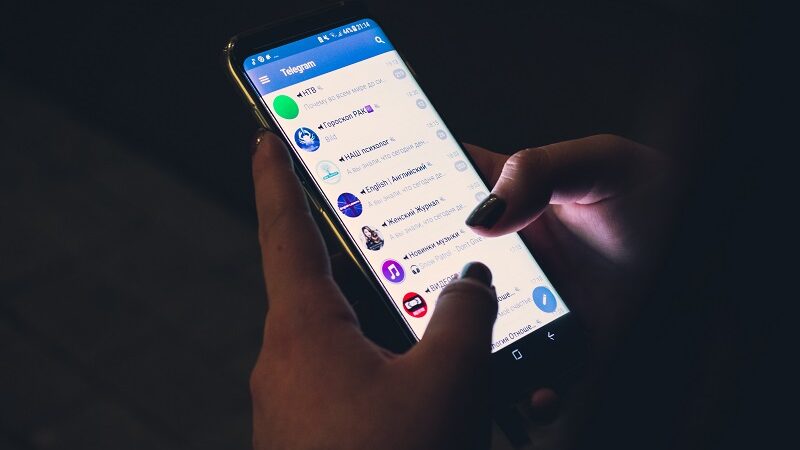A melting pot for right-wing extremists, conspiracy theorists and terrorists: that’s how harshly the Messenger service Telegram is currently being criticized. What is behind the Telegram criticism and is it really justified?
It seems to be the new enfant terrible of the network world: the messenger service Telegram. For years, the messaging app was considered a secure alternative to WhatsApp. But now accusations against Telegram are mounting.
The messenger service is allegedly a danger to our society and a reservoir for extremists. What is behind this Telegram criticism and how dangerous is the app really?
Telegram was long considered a freedom app
Just a few years ago Telegram was considered a harmless messenger in Germany. Many used the app as an alternative to WhatsApp. Especially the high anonymity and data security convinced many users.
Internationally, the app even had the reputation of a protest app in some cases. Telegram was used to organize opposition groups in countries with authoritarian regimes.
Demonstrators in Iran used the app, as did the freedom movement in Hong Kong and in Belarus, Telegram is the app of choice for the opposition movement.
It is no coincidence that all these protest movements use Telegram of all things. The service not only offers end-to-end encryption and can be used reliably even with slow Internet connections. It is also incredibly difficult to block.
Even in countries like Iran or Russia, where Telegram is officially banned, apps like Psiphon and VPN servers allow Telegram to circumvent most firewalls and use the app despite the ban. Few other messengers can do this.
In addition, Telegram offers some security functions that are elementary important for opponents of violent regimes. You can delete chat histories quickly and easily. For example, if demonstrators are arrested and their smartphones confiscated, it is easy to delete incriminating information.
In chat groups, on the other hand, members’ phone numbers are blocked – unlike with WhatsApp, for example. This makes it almost impossible to identify individual users. The chat groups in turn are another reason why so many regime critics choose Telegram.
The chat groups can connect many users in a very clear way. Large groups can be quickly informed and mobilized – for example, for protest marches.
But – and this is where the Telegram criticism begins – just as regime critics use the app to escape prosecution, so do criminals and terrorists.
Telegram critique: propaganda channel for extremists?
In Great Britain, for example, Telegram is the app of choice for drug dealers. In India, music is illegally distributed via the app. And the terrorist organization “Islamic State” is also known to use Telegram predominantly.
Criminals in Germany also appreciate the anonymity of Telegram. The magazine Vice has therefore called Telegram a “darknet alternative”.
In Corona times, further accusations are now added. The biggest Telegram criticism is about the chat groups. For just as demonstrators for peace movements organize themselves in the groups, in Germany right-wing extremists, conspiracy theorists and corona deniers can be found in Telegram groups.
Through such groups, users then organize large demonstrations such as the “Hygiene Demo”. It is therefore not surprising that pop singer Michael Wendler invited his fans to follow him on Telegram after his Corona scandal.
Because users can exchange their opinions in the Telegram groups almost undisturbed, no matter how extreme or absurd or even dangerous it may be. Unlike on social media channels like Facebook or Twitter, there is no external fact check or deletion of hate messages.
This is mainly due to the attitude of the Telegram founders.
Telegram criticism is also directed at dubious founders
The Russian brothers Nikolai and Pawel Durov are behind the messenger service. Especially Pavel Durov is known for his eccentric personality. One could call him a Russian cross between Mark Zuckerberg and Elon Musk.
As a student he started, similar to Zuckerberg, the meanwhile very successful communication platform VKontakte. He himself is obsessed with the film “The Matrix” and sees himself, similar to the protagonist Neo, as a programmer with a social mission.
As The Guardian reports, Durov lives a very secluded life. In fact, he and his team move from country to country and are hard to find. There are therefore accusations of dubious business practices.
Durov rarely gives interviews because most journalists would not meet his high standards.
Now and then he makes a name for himself with media-effective actions. For example, he once threw 5,000 ruble banknotes (about 55 euros) out of a window just to make fun of how people on the street picked them up.
He also has no problem giving authority figures such as Russian President Vladimir Putin the virtual finger. When the Russian government asked him to delete opposition groups on telegram, Durov posted a photo with a dog in a hoodie on Twitter. “This is my official answer for the security services,” he wrote.
But the Durov brothers also refuse to delete or censor extremist or illegal content on Telegram. And this in turn bothers various governments and security agencies.
Governments want more cooperation in this respect to fight crime and to find criminals and terrorists.
So far, the founders of Telegram have refused to cooperate with governments. However, there has recently been cooperation with Europol to paralyze numerous IS bot channels on Telegram.
Is Telegram criticism justified?
The Telegram criticism is understandable. After all, the app’s private chat channels promote the formation of filter bubbles and echo chambers in which opinions of dissenters no longer penetrate.
This is particularly dangerous in the context of conspiracy theorists, since people can radicalize so quickly.
Therefore, the question arises to what extent the founders of Telegram are not also socially responsible for their platform and the content distributed on it.
The massive spread of the App. In 2015 Telegram still had 60 million users worldwide. In April 2020 there were more than 400 million. Allegedly 1.5 million new users are added every day.
Nevertheless, it is also problematic to delete Telegram groups or ban the app.
Especially in a democracy, freedom of opinion must be protected. A healthy democracy should actually be able to withstand extreme differences of opinion and offer free space for uncensored discussion. This is exactly what distinguishes a democracy from an authoritarian regime.
At the same time, radicalized telegram users would also see such an action as confirmation of their conspiracy theories.
Experts therefore think it makes more sense to offer users alternative channels on Telegram, as the Federal Ministry of Health has done. However, there are still very few of these channels.
For the problem is not necessarily Telegram itself, but rather the isolated debate among users. It would therefore be important to discuss openly and publicly with the users and to meet them at eye level in order to start a dialogue again.
Otherwise these users will only withdraw further and look for new alternatives to Telegram if necessary.










